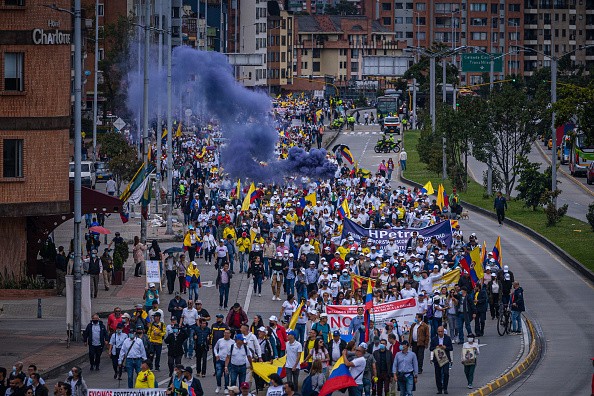
On Sunday, thousands of Colombians took to the streets in the latest rebuke of leftist President Gustavo Petro's reform agenda.
The protests are not the first against Petro since he took office 20 months ago; however, they are the largest.
The protesters demonstrated in several cities, including the capital. Bolivar Plaza was crowded with protesters in front of the presidential palace in Bogota.
Medical associations, opposition parties, and even some of Petro's former allies had called on Colombians to rally against the violence that was corrupting the ongoing peace negotiations with armed guerrilla groups as well as against the reforms that Petro was attempting to impose, such as nationalizing health services.
Martha Estrada, a 64-year-old pensioner wearing a tricolor hat in Bogota, told AFP that she voted for change for Petro, but they were still in the same situation. She protested because she thought Colombia still had hope and loved her country.
Petro wrote on X, formerly Twitter, that while the protests were "weak" in 18 other towns, they were "large" in Medellin, Bogota, and Bucaramanga.
He called the protests a "soft coup" to thwart reforms and that the primary goal of the demonstrations was to yell "Petro Out" and overthrow the government. He called for a massive pro-government march on March 1.
Many waved Colombian flags, while white-shirted medical professionals and physicians carried banners opposing Petro's healthcare reforms, which have drawn harsh criticism.
The president wants to see less of a role for private companies in delivering healthcare services.
Julio Rivero told AFP in Bogota that he was there as a citizen, a doctor, and a Colombian. He claimed that a doctor sees the deterioration because there are no drugs to give their patients, and patients face delays in getting treatment.
Furthermore, most experts agree that reforms to the healthcare system are necessary, but others are skeptical about the government's proposed plan.
Petro's ambitious "total peace" policy, which sought to stop six decades of violent warfare, has also seen setbacks.
© 2026 HNGN, All rights reserved. Do not reproduce without permission.








